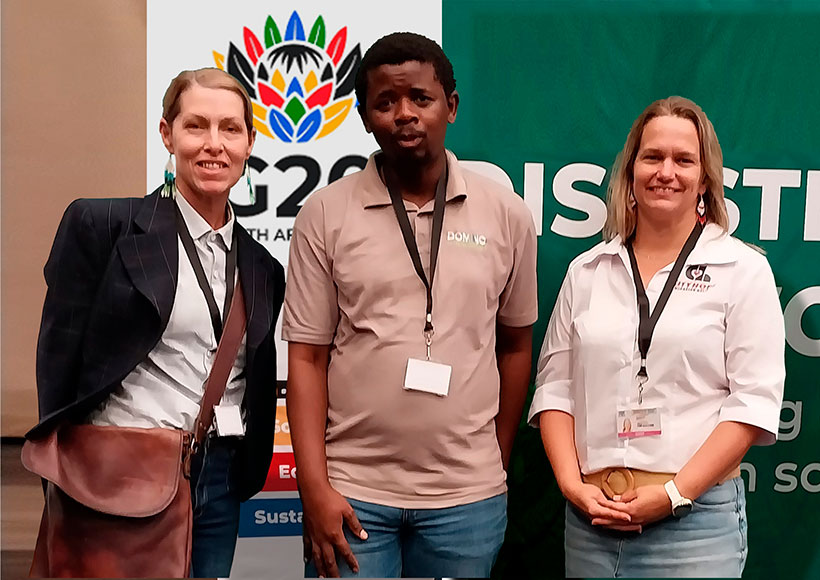
Delegates from more than 20 countries discussed the importance of and strategies for cooperation to strengthen disaster preparedness and resilience. The participants in the G20 Disaster Risk Reduction Working Group met in Durban in April and have now departed. It is certain that calamities, natural or otherwise, will happen in our country and the victims will be looking to government and civil society for help. Two local attendees at the meeting were Cathy Whittle, The Domino Foundation’s operations manager, and Catherine Smith, general manager at CityHope Disaster Relief, Hillcrest.
The two women spoke of how extensive work has already been done in laying foundations for effective disaster preparedness and mitigation across the country and how, locally and in other provinces, NPOs and other groups working together have “been meeting crisis situations and have partnered to create resilient communities able to deal with future disasters. “KZN Response has functioned for several years fostering connections, strengthening governance, and improving access to resources and services,” Catherine explained. “We engage with community members, especially vulnerable groups, to build long-term resilience.”
In addition to often being amongst first responders, the KZN partnership is involved in risk management, which includes education, awareness programmes, and preparedness initiatives. Recently, there was a meeting of groups with similar aims from across South Africa. This led to the formation of Respond SA, a Christian-centred organization whose stated purpose is “Empowering Disaster Relief through Faith and Action” with the aim of providing “…effective, timely, and organized disaster relief”. Cathy went on to explain that, over the past couple of years, an exercise has been conducted to map the entire country: “An outcome of two national conferences where likeminded faith-based NPOs shared areas of specialised offerings and common activity, was that we had to know who was able to come to the immediate aid of victims of disasters. Sometimes it would have to be some individual or informal community group in the more remote areas. We needed to have established contact there so that, in a crisis situation, there would already be someone in situ who could provide initial aid and contact outside help.”
With a national body having been formalised, a centralized hub has been established for information sharing, resource allocation, and response efforts through collaborating with various stakeholders - government agencies, NGOs, churches, and community groups - to gather and disseminate critical information on disaster-affected areas. Catherine described Respond SA’s training and preparation programmes to increase the capacity to respond effectively to disasters: “Through interactive sessions, simulations and tabletop exercises, participants develop the skills to navigate the complexities of disaster response and recovery.”
The pair talked of how there is a significantly increased capacity to respond to and be effective in mitigating the inevitably traumatic results of a disaster. “Whether it’s a relatively localised event like shack fires in an informal settlement, or widespread damage after a tornado or flood, there will be people in distress. Our mandate, as independent organisations or as a provincial or national team, is to answer the call by individuals, families, or entire communities”. With Respond SA now in place, regional coordinators have been designated for seven of the nine provinces. Personnel are being sought for Northern Cape and North West. The group has prioritised growth across the nation, disaster-response and preparedness training, building awareness, and humanitarian aid fund-raising. Cathy commented that the approach is holistic and monitoring and evaluation is a crucial part of the learning and adapting processes.
What were their takeaways from the G20 gathering? Catherine , who is coordinator for KZN and Eastern Cape, said “The job is big, but, with a formalised national and provincial structure in place, we will be in a far stronger position to be significant players in the disaster relief and recovery processes.” Cathy invited interested faith-based groups and individuals to go to Respond SA’s website www.respondsa.co.za.

